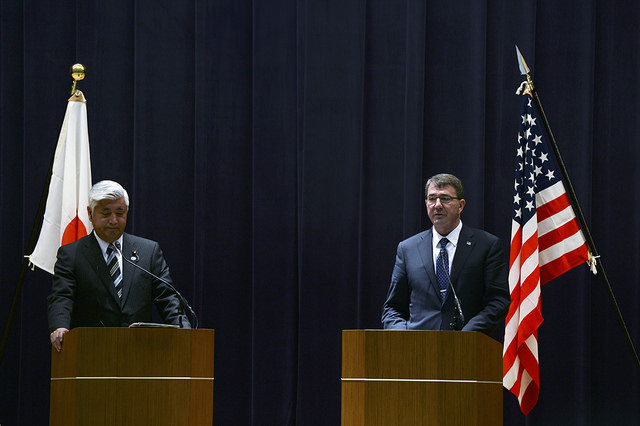At the recent meeting of the US–Japan Cyber Defense Policy Working Group, both countries agreed to deepen their already extensive cyber cooperation. In a joint statement the two nations spoke of the increasing risk posed by malicious cyber actors in the region, and released their ‘shared views’. Japan and the US have agreed to assist each other in the event of a major cyber incident that threatens their partner’s national security. The statement made a point that following a major cyber event ‘the DOD will consult with the MOD and support Japan via all available channels, as appropriate.’ This inclusion has led some in the media to see the move as one that brings Japan under the ‘cyber defence umbrella’ of the US.
On Monday China’s cyber police stepped out from behind the shadows. The existence of the ‘internet inspection force’ responsible for detecting cybercrime and ‘preventing improper words and deeds online’ was officially acknowledged by the Ministry of Public Security. Units at over 50 locations across China launched social media profiles to help them to ‘get their message out’ and better connect with the public. Early offerings from the accounts ranged from the bizarre (‘air conditioning makes your feet cold’) to the somewhat helpful (‘watch out for wedding invitations bearing viruses’) to the threatening (‘don’t spread rumours online or we’ll pull you in for questioning’).
The state owned China Daily reported this week that China is developing a new cybersecurity plan. The five-year strategy to protect state secrets and data will make global tech giants nervous as the Chinese government has already foreshadowed that the plan may make foreign produced software illegal on government computers and within the finical sector.
The UN’s International Atomic Energy Agency is currently holding its first ever conference on cyber security and nuclear facilities at its headquarters in Vienna. The International Conference on Computer Security in a Nuclear World was launched by IAEA Director General Yukiya Amano to an audience of 650 experts from 92 member states and 17 regional and international organisations. The conference seeks to position itself as a forum for the exchange of best practice, to build cooperation and understanding of national approaches, as well as knowledge on threats and security for industrial control systems. The conference is a welcome move with critical national infrastructures increasingly targeted by hackers around the world.
In other multilateral cyber forum news, the ITU has played host to The World Summit on the Information Society Forum 2015 (WSIS) in Geneva, billed as ‘the world’s largest gathering of the ICT for Development community’. Topics discussed included everything from spam to CERTS, building trust and confidence between states, the internet of things and development. John Quinn, Australia’s Ambassador to the UN in Geneva, spoke at the forum sharing his views on building trust and relaying the positive outcomes from last year’s ARF CBM workshop in Kuala Lumpur, led by Australia and Malaysia. A rundown of the conference’s highlights are now available online.
Finally, cyber security expert Brian Krebs was in Sydney this week for AISA’s Cyber Security Symposium. Krebs appeared on Monday night’s Lateline program to share some of his insights on the Sony hack and Russian cybercrime, and imparted some solid cyber hygiene tips. Check out the video here.


